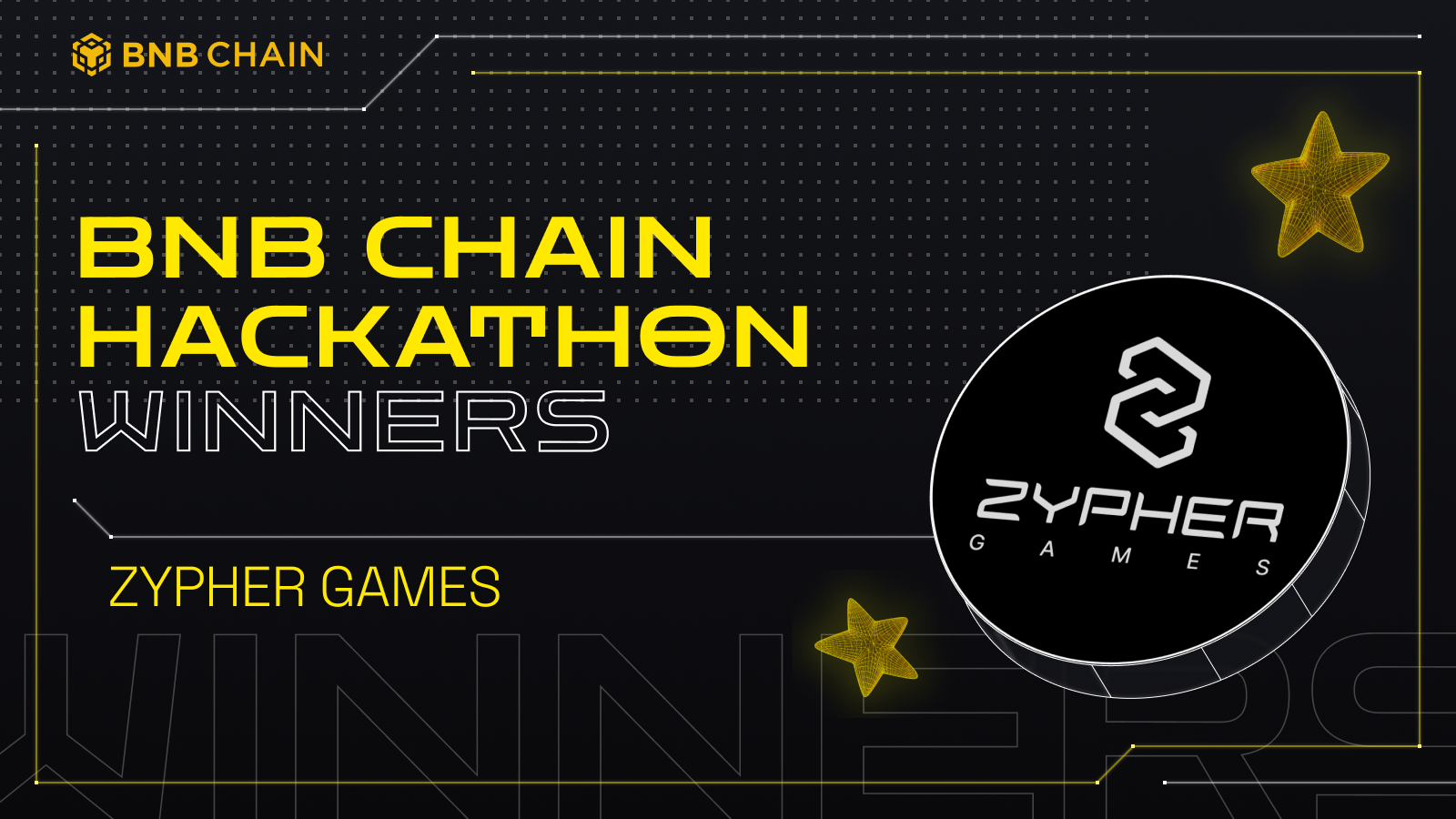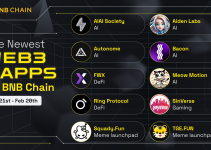Table of Contents

In this blog, we spotlight one of the winning projects in the recent BNB Chain Hackathon in Istanbul – Zypher Games.
Zypher’s Games Engine enables fully decentralized gaming, powered by Zero Knowledge Proofs and AI, to create Autonomous Worlds within its games.
Project Interview
Tell us about Zypher Games!
Zypher is a leading gaming platform powered by Zero-Knowledge Proofs (ZKP) and Artificial Intelligence (AI), providing next-generation infrastructure for the creation of Autonomous Worlds. Its game engine offers a plug-and-play and a one-stop zk solution to empower DApp developers to build rich, fully on-chain experiences with guaranteed scalability, fairness, and strategic complexity.
What is the background of the core team at Zypher Games and how did you meet each other?
The Zypher team consists of 15-20 passionate professionals. We come from diverse backgrounds across FinTech, gaming, and blockchain, united by a shared vision for the future of Web3 gaming. Our journey began at the start of BNB Smart Chain, when we recognized the team’s complementary skills and aligned objectives.
How did you come up with the idea for your project?
The idea for Zypher Games emerged from the ambition to build fully on-chain games as manifestations of Autonomous Worlds. We recognized a significant gap in the market: the absence of a robust infrastructure for fully on-chain games that could also deliver a superior player experience.
This was a challenge we experienced firsthand, where existing platforms either compromised on gameplay quality for blockchain integration or couldn’t fully harness blockchain capabilities and used centralized servers.
Our vision was to create a seamless blend of intricate game mechanics with the transparency and fairness of blockchain, leading to the birth of Zypher Games.
What Zypher Games solves & user benefits
How is your project related to opBNB or BNB Greenfield?
Advancements in infrastructure, particularly through BNB Chain’s innovative storage and scalability solutions like BNB Greenfield and opBNB, are making strides in addressing these issues. Game developers choose to build on those infrastructures for low-latency, highly-scalable, cost-effective, and decentralized gameplay.
For those developers building on top of opBNB or BNB Greenfield, Zypher’s Universal ZK Game Engine provides a highly modular, plug-n-play, comprehensive zk solution set. This enables dApp developers to create fully on-chain gameplay affordably, leveraging a highly optimized ZKP library with various gadgets and circuits.
What is the problem and how are you solving it?
Despite growing momentum, Web3 gaming still faces critical challenges that hinder its widespread adoption, especially when it comes to fully on-chain games. These challenges include high latency which can impede real-time interaction, elevated transaction costs that may deter players, and scalability issues that restrict the number of concurrent transactions or players. These challenges have historically restricted the real-world adoption of Web3 games by mainstream gamers.
Zero Knowledge Proofs (ZKPs) is one solution to all the problems mentioned above, which serve as a versatile tool, facilitating an extensive range of scalability and privacy enhancements across various applications. They offer solutions to some of blockchain’s inherent limitations, enabling real-time interactions, transaction cost efficiency, and handling of incomplete information.
● Scalability and concurrency: Players’ move logs – including multiple moves – can be aggregated into ZK proofs. This single proof approach significantly improves gas efficiency and scalability, supporting hundreds of concurrent in-game transactions
● Provable Fairness: On-chain verifier APIs enable fast verification of all moves in a proof, ensuring integrity of game process & results
● Information Asymmetry: Without ZK proofs, fully on-chain games struggle with enabling information imperfection. ZKPs make it possible to support essential strategy game mechanics for games like Fog of War without relying on centralized servers
What is a memorable story about your project’s journey?
During our development of our ZK on-chain tech, we had to figure out the best way to do randomization using traditional means which presented issues in both latency and gas costs. We used an external provider Verifiable Random Function (VRF) along with Elliptic Curve Pairing to achieve part of our ZK-circuit. We are constantly improving as time goes on and anyone that’s interested can check our documentation for a full breakdown.
A community team successfully deployed a fully on-chain version of the 2048 game on Zypher Games’ platform using Zero-Knowledge (ZK) proofs to aggregate multiple transactions into a single proof, achieving this first on the opBNB network. However, when attempting to deploy the game on a different network, they encountered a challenge with the elliptic curve (EC) used in their cryptographic operations, as the network didn’t support the required EC pairing.
To overcome this, Zypher Games provided the team with an alternative ZK protocol. This switch not only resolved the compatibility issues but also resulted in faster proof generation and improved gameplay. The new protocol allowed for more efficient processing of in-game moves in a single proof, leading to a significant enhancement in both the game performance and the overall user experience. This successful adaptation demonstrates Zypher Games’ commitment to supporting developers in our community and our ability to innovate and adapt in the dynamic landscape of blockchain gaming.
Zypher Games’s Hackathon Journey
What made you want to apply to the BNB Chain hackathon?
The BNB Chain Hackathon’s emphasis on blockchain technology innovation, particularly its focus on BNB Greenfield and opBNB, was a major draw for us. This event represented an ideal arena to push the boundaries of blockchain capabilities, aligning perfectly with our mission to innovate in fully on-chain gaming. The opportunity to engage with and learn from others working on similar challenges in the blockchain space was invaluable, offering a platform for collaboration, growth, and showcasing our unique solutions in this evolving field.
What did you learn during the hackathon and how did you apply it to your project development?
We’d love to extend special thanks to Polyhedra. The integration of the VRF function from Polyhedra ensures randomness of each game board, adding an extra layer of fairness and challenge to the gaming experience.
Interoperability is an important aspect for worlds to be fully autonomous. Further plans for Crypto Rumble include integration with Polyhedra’s zkBridge for gamers to seamlessly migrate their game loot and achievements between chains. We could also be hosting a multi-chain tournament for gamers from each ecosystem to compete with each other.
How did the Hackathon differ from other hackathons you have participated in?
It provided unique mentorship opportunities and a platform to interact with experts deeply invested in the future of blockchain technology. Industry experts from Polyhedra, Open Campus, SpaceID provided invaluable insights, mentoring teams to overcome long-standing industry challenges.
What are your project’s future plans?
Since the hackathon, we’ve received substantial support, including networking opportunities, exposure to potential investors and guidance on scaling our platform. This support has been instrumental in our post-hackathon growth and development.
We are releasing a “Thanksgiving Edition” demo of the winning product Crypto Rumble to further celebrate with our community. Stay tuned to our social accounts for more.


